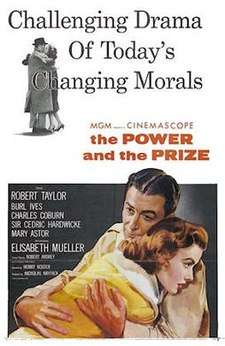The Power and the Prize
The Power and the Prize is a 1956 drama film directed by Henry Koster, written by Robert Ardrey, starring Robert Taylor and Burl Ives. It was nominated for an Academy Award in 1957 for costume design.[2]
| The Power and the Prize | |
|---|---|
 Theatrical Film Poster | |
| Directed by | Henry Koster |
| Produced by | Nicholas Nayfack |
| Written by | Robert Ardrey; based on Howard Swiggett's novel of the same name |
| Starring | Robert Taylor |
| Music by | Bronislau Kaper |
| Cinematography | George J. Folsey |
| Edited by | George Boemler |
| Distributed by | Metro-Goldwyn-Mayer |
Release date |
|
Running time | 98 minutes |
| Country | United States |
| Language | English |
| Budget | $1,455,000[1] |
| Box office | $1,070,000[1] |
Plot
Although he is scheduled to wed his boss George Salt's niece that weekend, Amalgamated World Metals vice chairman Cliff Barton is sent to London to conduct a business deal that will enrich the firm. Salt considers him a protege and intends to turn over control of the company to Barton someday, insisting to him that business always comes first.
Cliff must hide the fact from Mr. Carew, who runs the British company, that Salt intends to unscrupulously assume control of the company rather than simply merge with it. While following through on Mrs. Salt's request to drop by her pet London-based charity, Cliff learns that it is actually a front for prostitutes run by a German refugee named Miriam Linka.
Although his loyalties are with the company, Cliff wants no part of betraying Carew's trust. He also, against all odds, falls in love with Miriam and persuades her to return to America with him to be married. Salt angrily tries to spin the guilt so that it appears Cliff was the one defrauding the British, while false accusations fly that Miriam is not only a prostitute but a Communist as well. Cliff must fight for his reputation and the woman he loves.
Cast
- Robert Taylor as Cliff Barton
- Burl Ives as George Salt
- Mary Astor as Mrs. Salt
- Cedric Hardwicke as Carew
- Charles Coburn as Guy Elliot
- Elisabeth Muller as Miriam
Reception
According to MGM records the film earned only $570,000 in the US and Canada and $500,000 elsewhere resulting in a loss of $883,000.[1]
See also
References
- The Eddie Mannix Ledger, Los Angeles: Margaret Herrick Library, Center for Motion Picture Study.
- https://www.imdb.com/title/tt0049635/awards